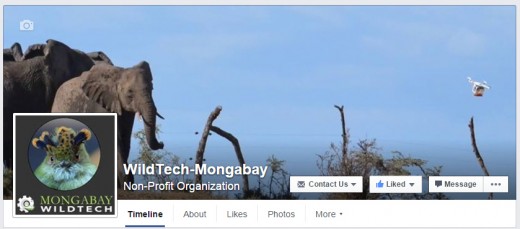- With 2-3 articles each week, wildtech.mongabay.com already offers over 70 posts on technologies ranging from DNA identification and a foldable microscope to global remotely sensed big data.
- Coming soon are posts on gaming, wood ID tech, and interviews with experts on wildlife tracking, human-wildlife conflict, and moving from biologist to engineer.
- We welcome your input and ideas on how to make our 2016 content even better.
This has been an exciting first six months for wildtech.mongabay.com. Your valuable feedback and the number of visits to the site in its first few months (over 70,000, thanks!) confirms our sense that the site fills an empty niche–linking researchers, front-line conservationists, engineers, and conservation donors interested in cutting-edge advances and creative uses of low and high-tech applications to save endangered wildlife and habitats.

During this time, we have posted 2-3 articles each week, totaling 70 stories and features on technologies to address challenges facing the conservation world today, including: combating poaching, reducing illegal logging, human-wildlife conflict, wildlife tracking, habitat monitoring, DNA analysis, data processing, communication, and species documentation. Creative conservationists across the globe are deploying beehive fences to ward off elephants from crops, robots and tiny cameras to capture wildlife behavior up close, and drones to assess habitat, improve agriculture, and locate poachers. We have captured decades of experience about applying new ideas and technologies to many of these challenges through interviews with outstanding practitioners, including Iain Douglas-Hamilton, Rodney Jackson, and Laurie Marker.
The best is yet to come. 2016 will bring a host of new stories from the field. Wildtech will continue to cover innovative applications from not just the scientific world, but the defense, communications, medical, and agricultural sectors. Can gaming help conservation? We’ll look into it. How about chili powder? When used carefully. What about novel ways of using animals with senses more keen than our own to study endangered species? Expert Carly Vynne Baker will be posting a thorough review soon of the use of scent dogs in several aspects of research and conservation.
We will continue our interviews with a two-part discussion with Dr. David Macdonald, head of WildCRU at Oxford University and the team studying Cecil the Lion. Stay tuned to hear David’s wide-ranging thoughts on lion conservation, the use and limits of technology, how breakthrough innovations come about, and the evolving shape of wildlife conservation in the 21st century.
We’ve added our first commentary post, from an important voice and world authority on Sumatran rhino conservation, Dr. John Payne, on list-ditch efforts to save this species from extinction and how established conservation biology practice has not helped the situation.

In February, we will also present the results of our technology needs assessment, conducted with input from leading wildlife biologists and front-line conservation professionals, which has served as a foundation for informing the issues and content we cover on this site. We invite you to experience an exciting month ahead.
If you haven’t visited our Facebook page, please do – we post daily not only on our latest wildtech posts, but also on many other studies, devices, or ideas that we simply can’t report on but we think might grab your attention. We are also now working to reach out directly to research groups, at universities, professional associations, and others involved in conservation. Please share the link to the site with your friends and colleagues.

Suzanne Palminteri, wildtech-mongabay’s Editor, and I would like to thank World Resources Institute, Tom McInerney, and Loretta Stadler for supporting the development of wildtech-mongabay content, the continued support and encouragement of Rhett Butler, founder and CEO of Mongabay.com, and all of you readers and those on the front lines of conservation. We hope our efforts will make your jobs easier and more successful. Write to us if you have ideas for stories for 2016. We welcome them.







